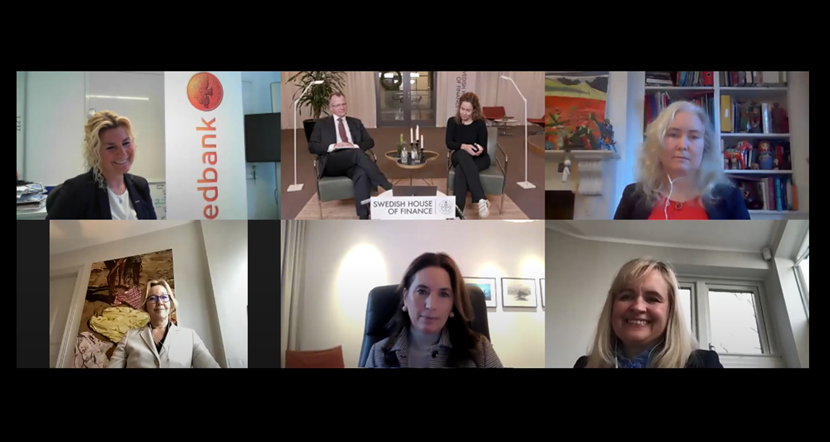Women in Finance – with the potential to make a real impact
dec. 03, 2020
How can we level the playing field for men and women interested in a career in finance? And what does the situation look like in the finance industry in the Nordics right now?

That was the theme of the roundtable discussion on 1 December hosted by Swedish House of Finance and the Swedish Securities Markets Association. Professor Renée B Adams, Said Business School, Oxford University, kicked off the lively discussions with a presentation on the role of measurement and institutions. She shared statistics on board diversity across countries and the reasons behind the differences. Her data showed that countries in which more women work full time have more female directors.
Key facts from her presentation:
– Women’s boardroom representation is lower than many people think
– Women’s representation varies widely across countries
– Women’s representation varies across sectors and finance is worse than many other sectors.
Awareness is changing – but some challenges remain
Urban Funered, Swedish Securities Markets Association, and Marieke Bos, Swedish House of Finance moderated the panel discussion. Elisabeth Beskow, CEO, DNB Bank ASA Sweden Branch; Maria Janson, Head of Markets, Swedbank; Johanna Norberg, Country Manager, Danske Bank Sweden; and Lena Österberg, Head of Equity Research, Carnegie Investment Bank shared their experiences and insights from the Nordic finance industry.
What do you think people outside the industry, especially women, think about the finance industry - do they know what we do and stand for?
– We do regular surveys among young professionals and it is clear that we are now competing with companies like Spotify and Google to attract talents. The media image of the banks has not been the most positive, which also is reflected in these surveys, as “brand purpose and culture” is increasingly important. We need to be better at explaining that banks are the foundation in the society – it is about financing growth and enabling people and companies, says Johanna Norberg.
What is your experience with KPIs aimed to make the financial sector more inclusive? Which ones would you suggest? Do we need more than KPI?
– I think KPIs are good! They put pressure on these issues and remind all managers to continuously strive for a gender balance. I prefer KPIs to rules. All teams and situations are different and there is a need for flexibility.
Good examples are KPIs for management teams to be gender-balanced; it forces environments with a dominance to reflect on how we build our management teams.
Another KPI that also works well is to always have a minimum of one female candidate for each position when we recruit in areas with male dominance. It forces us to think outside the box and challenge ourselves to look extra before taking decisions, says Maria Janson.
What is according to you the key competencies needed to work in the financial sector? Do you need a finance/econ/business background for this?
– You need to be interested in people to work in the financial sector. It definitively helps if you are interested in numbers and have a background in finance, economy, or technical education, but it’s not necessary. I also find it interesting that some of the best people I’ve met in the industry have a true passion for helping businesses and individuals to achieve their goals. They are motivated by the success of others, says Elisabeth Beskow.
What would your message be to those tuning in to the webinar that are interested in a career in finance?
– To all the women listening in – see each other as allies, not competitors. There is strength in numbers when it comes to changing perceptions and workplace culture. Support each other to ensure that you all last. Throughout your career you will also build a strong network, which will provide support and advice, says Lena Österberg.
